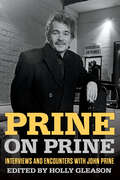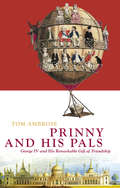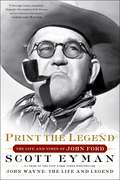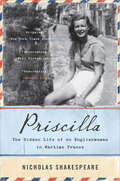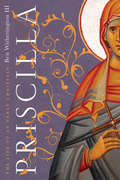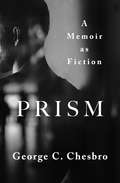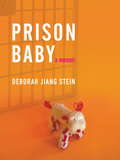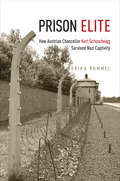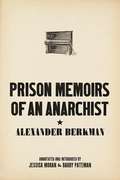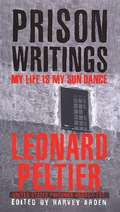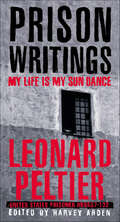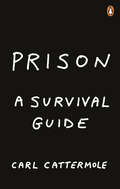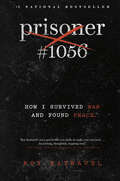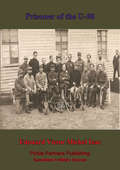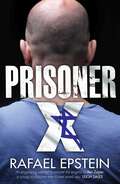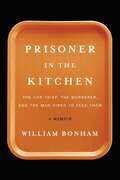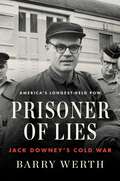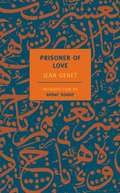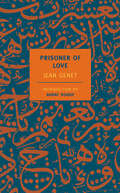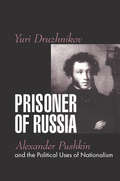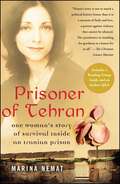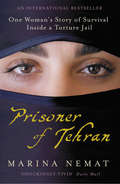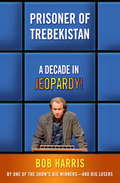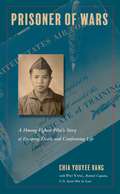- Table View
- List View
Prine on Prine: Interviews and Encounters with John Prine (Musicians in Their Own Words #20)
by Holly Gleason"As close to an autobiography as we're going to get from John Prine, Prine on Prine captures the inimitable, whimsical voice of one of our greatest songwriters . . . Nashville legend Holly Gleason knew the man and assembled this brilliant collection with a knowing eye and loving heart." —Joel Selvin, author of Fare Thee Well: The Final Chapter of the Grateful Dead's Long, Strange Trip and other booksCurated by a critic who knew him across five decades, Prine on Prine distills the essence of an iconic American writer: unguarded, unfiltered and real. In his own words, in his own time—on the road, in the kitchen, the Library of Congress, radio shows, movie scripts, and beyond. John Prine hated giving interviews, but he said much when he talked. Embarrassed by fame, delighted by the smallest things, the first songwriter to read at the Library of Congress, and winner of the Pen Award for Literary Excellence, Prine saw the world unlike anyone else. The songs from 1971's John Prine remain spot-on takes of the human condition today, and his writing only got richer, funnier, and more incisive. The interviews in Prine on Prine trace his career evolution, his singular mind, his enduring awareness of social issues, and his acute love of life, from Studs Terkel's radio interviews from the early '70s to Mike Leonard's Today Show packages from the '80s, Cameron Crowe's early encounter to Ronni Lundy's Shuck Beans, Stack Cake cookbook, and Hot Rod magazine to No Depression's cover story, through today. Editor Holly Gleason enjoyed a longstanding relationship with Prine and his longtime co-manager, and she often traveled with him on tours in the late 1980s and represented him in the 2000s.
Prinny and His Pals: George IV and the Remarkable Gift of Royal Friendship
by Tom AmbroseFrom the first biography of George IV in 1831 to the last in 2001, Mad King George's son has commonly been held up to ridicule as a weak, selfish, and incompetent spendthrift, barely tolerated by his ministers, loathed by most of his family, and dependent on the emotional support of grasping mistresses. However, acclaimed historian Tom Ambrose--author of Godfather of the Revolution: The Life of Phillipe Egalité, Duc D'Orléans--has uncovered new details on "Prinny" that suggests that, for all his faults, George IV just may have been the most humane and amusing of all British monarchs, notwithstanding his love of the high life. Central to the story is the vast array of friends that populate a remarkable reign as Prince Regent and King. If Prinny, as they knew him, was so grotesquely foolish, how did he amass such a fascinating (and loyal) group of friends? Could any other British ruler count among his friends the country's most brilliant playwright (Richard Sheridan), or the wiliest statesman (Charles Fox), or the greatest political philosopher (Edmund Burke), not to mention perhaps the biggest loveable rogues' gallery London ever saw? The truth was that Prinny's occasional buffoonery and imposing girth made him the perfect target for political satirists and cartoonists--at their zenith during his reign--and his high qualities have been consistently overlooked. This warm, funny, and affectionate portrait displays George at his very best: delighting some of the finest minds of his generation, easily winning over his subjects and his family as well as treating his lovers with care and concern--and roistering with all his pals.
Print the Legend: The Life and Times of John Ford
by Scott Eyman"When the legend becomes fact, print the legend." This line comes from director John Ford's film, The Man Who Shot Liberty Valance, but it also serves as an epigram for the life of the legendary filmmaker. Through a career that spanned decades and included work on dozens of films -- among them such American masterpieces as The Searchers, The Grapes of Wrath, The Quiet Man, Stagecoach, and How Green Was My Valley -- John Ford managed to leave as his legacy a body of work that few filmmakers will ever equal. Yet as bold as the stamp of his personality was on each film, there was at the same time a marked reticence when it came to revealing anything personal. Basically shy, and intensely private, he was known to enjoy making up stories about himself, some of them based loosely on fact but many of them pure fabrications. Ford preferred instead to let his films speak for him, and the message was always masculine, determined, romantic, yes, but never soft -- and always, always totally "American." If there were other aspects to his personality, moods and subtleties that weren't reflected on the screen, then no one really needed to know. Indeed, what mattered to Ford was always what was up there on the screen. And if it varied from reality, what did it matter? When you are creating legend, fact becomes a secondary matter. Now, in this definitive look at the life and career of one of America's true cinematic giants, noted biographer and critic Scott Eyman, working with the full participation of the Ford estate, has managed to document and delineate both aspects of John Ford's life -- the human being and the legend. Going well beyond the legend, Eyman has explored the many influences that were brought to play on this remarkable and complex man, and the result is a rich and involving story of a great film director and of the world in which he lived, as well as the world of Hollywood legend that he helped to shape. Drawing on more than a hundred interviews and research on three continents, Scott Eyman explains how a saloon-keeper's son from Maine helped to shape America's vision of itself, and how a man with only a high school education came to create a monumental body of work, including films that earned him six Academy Awards -- more than any filmmaker before or since. He also reveals the truth of Ford's turbulent relationship with actress Katharine Hepburn, recounts his stand for freedom of speech during the McCarthy witch-hunt -- including a confrontation with archconservative Cecil B. DeMille -- and discusses his disfiguring alcoholism as well as the heroism he displayed during World War II. Brilliant, stubborn, witty, rebellious, irascible, and contradictory, John Ford remains one of the enduring giants in what is arguably America's greatest contribution to art -- the Hollywood movie. In Print the Legend, Scott Eyman has managed at last to separate fact from legend in writing about this remarkable man, producing what will remain the definitive biography of this film giant.
Priscilla: The Hidden Life of an Englishwoman in Wartime France
by Nicholas ShakespeareWhen Nicholas Shakespeare stumbled across a box of documents belonging to his late aunt, Priscilla, he was completely unaware of where this discovery would take him and what he would learn about her hidden past. The glamorous, mysterious figure he remembered from his childhood was very different from the morally ambiguous young woman who emerged from the trove of love letters, photographs, and journals, surrounded by suitors and living the dangerous existence of a British woman in a country controlled by the enemy. He had heard rumors that Priscilla had fought in the Resistance, but the truth turned out to be far more complicated.As he investigated his aunt's life, dark secrets emerged, and Nicholas discovered the answers to the questions over which he'd been puzzling: What caused the breakdown of Priscilla's marriage to a French aristocrat? Why had she been interned in a prisoner-of-war camp, and how had she escaped? And who was the "Otto" with whom she was having a relationship as Paris was liberated?Piecing together fragments of one woman's remarkable and tragic life, Priscilla is at once a stunning story of detection, a loving portrait of a flawed woman trying to survive in terrible times, and a spellbinding slice of history.
Priscilla: The Life of an Early Christian
by Ben Witherington IIIWho was Priscilla? Readers of the Bible may know her as the wife of Aquila, Paul's coworker, or someone who explained baptism to Apollos. Biblical references to Priscilla spark questions: Why is she mentioned before her husband? Does the mention of her instruction of Apollos mean that women taught in the church? What is her story? Ben Witherington addresses these questions and more. In this work of historical fiction, Priscilla looks back on her long life and remembers the ways she has participated in the early church. Her journey has taken her to Ephesus, Corinth, and Rome, and she's partnered with Paul and others along the way. Priscilla's story makes the first-century world come alive and helps readers connect the events and correspondence in different New Testament books. Witherington combines biblical scholarship and winsome storytelling to give readers a vivid picture of an important New Testament woman.
Prism: A Memoir as Fiction
by George C. ChesbroThe author of the Mongo Mysteries reveals the interior life of a troubled writer in this deeply personal autobiographical novel. At the age of fifty-eight, author Garth Fugue is adrift. For the last forty years he has poured his soul into twenty-three novels and countless short stories, all filled with murder and mayhem. By delving into the troubled minds of his characters, he has kept his own demons at bay. Now, Garth is at a crossroads. Despite his floundering literary career, he is attempting to write his magnum opus while simultaneously teaching at a children&’s psychiatric hospital. As he decides what to write about, Garth must ultimately wrestle with his own beliefs about humanity, morality, and the meaning of it all. In this insightful novel, George C. Chesbro exposes a fictional writer&’s tortured mind and, in doing so, divulges the struggles of the real, complicated man best known for penning quirky mysteries and pulpy thrillers. It is an intimate invitation not to be missed.
Prison Baby
by Deborah Jiang SteinA deeply personal and inspiring memoir recounting one woman's struggles--beginning with her birth in prison--to find self-acceptance Prison Baby is a revised and substantially expanded version of Deborah Jiang Stein's self-published memoir, Even Tough Girls Wear Tutus. Even at twelve years old, Deborah, the adopted daughter of a progressive Jewish couple in Seattle, felt like an outsider. Her mixed Asian features set her apart from her white, well-intentioned parents who evaded questions about her past. But when she discovered a letter revealing the truth of her prison birth to a heroin-addicted mother--and that she spent the first year of life in prison--Deborah spiraled into emotional lockdown. For years she turned to drugs, violence, and crime as a way to cope with her grief. Ultimately, Deborah overcame the stigma, shame, and secrecy of her birth, and found peace by helping others--proving that redemption and acceptance are possible even from the darkest corners.From the Trade Paperback edition.
Prison Elite: How Austrian Chancellor Kurt Schuschnigg Survived Nazi Captivity
by Erika RummelAfter the Anschluss (annexation) in 1938, the Nazis forced Austrian Chancellor Kurt Schuschnigg to resign and kept him imprisoned for seven years, until his rescue by the Allies in 1945. Schuschnigg’s privileged position within the concentration camp system allowed him to keep a diary and to write letters which were smuggled out to family members. Drawing on these records, Prison Elite paints a picture of a little-known aspect of concentration camp history: the life of a VIP prisoner. Schuschnigg, who was a devout Catholic, presents his memoirs as a "confession," expecting absolution for any political missteps and, more specifically, for his dictatorial regime in the 1930s. As Erika Rummel reveals in fascinating detail, his autobiographical writings are frequently unreliable. Prison Elite describes the strategies Schuschnigg used to survive his captivity emotionally and intellectually. Religion, memory of better days, friendship, books and music, and maintaining a sense of humour allowed him to cope. A comparison with the memoirs of fellow captives reveals these tactics to be universal. Studying Schuschnigg’s writing in the context of contemporary prison memoirs, Prison Elite provides unique insight into the life of a VIP prisoner.
Prison Memoirs of an Anarchist
by Barry Pateman Alexander Berkman Jessica Moran"A book of rare power and beauty, majestic in its structure, filled with the truth of imagination and the truth of actuality, emphatic in its declarations and noble in its reach."-Bayard Boyesen, Mother Earth. "No other book discusses so frankly the criminal ways of the closed prison society."- Kenneth RexrothIn 1892, Alexander Berkman tried to assassinate Henry Clay Frick for the latter's role in violently suppressing the Homestead Steel Strike. Berkman's attempt was unsuccessful. Berkman spent the next fourteen years in Pennsylvania's Western Penitentiary. Upon release, he wrote what was to become a classic of prison literature, and a profound testament to human courage in the face of oppression.This new edition of his account of those years is introduced and fully annotated by Barry Pateman and Jessica Moran, both former associate editors of the Emma Goldman Papers at the University of California Berkeley. Their efforts make this the definitive version of Berkman's tale of his transformation within prison, his growing sympathy for those he'd considered social parasites, and the intimate relationships he developed with them. Also includes never-before-published facsimile reprints and transcriptions of the diary Berkman kept while he wrote this book, conveying the difficulties he had reliving his experiences.Alexander Berkman (1870-1936) was a leading writer and militant in the anarchist movement and author of the classic primer What is Anarchism?Barry Pateman was associate editor of Emma Goldman: A Documentary History, and editor of Chomsky on Anarchism. He is a historian and member of the Kate Sharpley Library collective.Jessica Moran, was an assistant editor of Emma Goldman: A Documentary History. She is a member of the Kate Sharpley Library collective and is an archivist currently living and working in New Zealand.
Prison Writings: My Life Is My Sun Dance
by Harvey Arden Leonard PeltierFrom the Book Jacket: "A deeply moving and very disturbing story of a gross miscarriage of justice and an eloquent cri de coeur of Native Americans for redress, and to be regarded as human beings with inalienable rights guaranteed under the United States Constitution, like any other citizens. We pray it does not fall on deaf ears. America owes it to herself." (Archbishop Desmond M. Tutu, Nobel Peace Laureate) "It would be inadequate to describe Leonard Peltier's Prison Writings as a classic of prison literature, although it is that. It is also a cry for help, an accusation against monstrous injustice, a beautiful expression of a man's soul, demanding release." (Howard Zinn, author of A People's History of the United States) "Listen to this fresh, brave voice, then inform yourself about the shameful case of Leonard Peltier." (Peter Matthiessen, author of In the Spirit of Crazy Horse) "This book takes the reader on an emotional and spiritual journey as Leonard Peltier's surprisingly hopeful reflections make the terrible injustice of his imprisonment for 24 years even more difficult to accept. Peltier's important journal details his trial and conviction which was based in part on admittedly false testimony and evidence so inconclusive that reasonable people everywhere have concluded that he should be granted clemency." (Wilma Mankiller, former chief of the Cherokee Nation, and author of Mankiller) "Leonard Peltier's words reveal a wise man who has become freer than his captors, despite his false imprisonment for a crime he did not commit. His thoughts here remind us of our true mission as Indian people, as human beings here on this humble, beautiful planet. These thoughts cannot be captured or locked behind bars, or destroyed by gunfire. They fly free." (Joy Harjo, Muskoke poet and musician, author of The Woman Who Fell From the Sky) "If you care about justice, read this brave book. If you care about the perpetuation of the white man's justice against the Native American, you must know the Leonard Peltier story." (Gerry Spence, author of Give Me Liberty!) Harvey Arden is the author and co-author of several books, including Wisdomkeepers and Travels in a Stone Canoe (both with Steve Wall) and Noble Red Man. He lives in Washington, DC. Other books by Harvey Arden are available from Bookshare.
Prison Writings: My Life Is My Sun Dance
by Leonard PeltierThe Native American activist recounts his evolution into a political organizer, his trial and conviction for murder, and his spiritual journey in prison.In September of 2022, twenty-five years after Leonard Peltier received a life sentence for the murder of two FBI agents, the Democratic National Committee unanimously passed a resolution urging President Joe Biden to release him. Peltier has affirmed his innocence ever since his sentencing in 1977—his case was made fully and famously in Peter Matthiessen’s bestselling In the Spirit of Crazy Horse—and many remain convinced he was wrongly convicted.A wise and unsettling book, Prison Writings is both memoir and manifesto, chronicling Peltier’s life in Leavenworth Prison in Kansas. Invoking the Sun Dance, in which pain leads one to a transcendent reality, Peltier explores his suffering and the insights it has borne him. He also locates his experience within the history of the American Indian peoples and their struggles to overcome the federal government’s injustices.Edited by Harvey Arden, with an introduction by Chief Arvol Looking Horse, and a preface by former Attorney General Ramsey Clark.Praise for Prison Writings“It would be inadequate to describe Leonard Peltier’s Prison Writings as a classic of prison literature, although it is that. It is also a cry for help, an accusation against monstrous injustice, a beautiful expression of a man’s soul, demanding release.” —Howard Zinn, author of A People’s History of the United States“For too long, both Leonard’s supporters and detractors have seen him as a metaphor, as a public figure worthy of political rallies and bumper stickers, but very rarely as a private man who only wants to go home. I pray this book will bring Leonard home.” —Sherman Alexie, author of Indian Killer
Prison: A Survival Guide
by Carl CattermoleThe cult guide to UK prisons by Carl Cattermole – now fully updated and featuring contributions from female and LGBTQI prisoners, as well as from family on the outside.Contains: Blood – but not as much as you might imagineSweat – and the prisons no longer provide soapTears – because prison has created a mental health crisisHumanity – and how to stop the institution destroying itFeaturing contributors Sarah Jake Baker, Jon Gulliver, Darcey Hartley, Julia Howard, Elliot Murawski and Lisa Selby.‘Essential reading’ Will Self‘We’re in the justice dark ages and Cattermole’s great book switches on the lights’Dr Theo Kindynis, Lecturer in Criminology Goldsmiths, University of London‘It has the potential to change a lot of people’s lives for the better’Daniel Godden, Partner at Berkeley Square Solicitors’
Prisoner #1056: How I Survived War and Found Peace
by Roy RatnavelAn incredible immigrant story from a prominent Canadian Tamil who fled torture and imprisonment, arrived in Canada with $50 in his pocket, then rose from the mailroom to the executive suite of the country&’s largest independent asset management company.Roy Ratnavel&’s astonishing journey began at age seventeen, when he was seized by government soldiers and interned in a notorious prison camp for no reason other than being born a Tamil. He saw friends die, and was tortured for a few months—until an unlikely encounter allowed him to send a message beyond the prison walls, which led to his release.Seeing nothing but more danger in his son&’s future, Ratnavel&’s father sought refuge for his son in Canada, far from the ethnic violence that was consuming Sri Lanka. When the consular immigration officer asked for proof that the boy&’s life was at risk in his homeland, Ratnavel simply lifted his shirt to show the man his unhealed scars. It wasn&’t long before he was on a plane. His father was shot and killed three days later.To repay the debt he owed to his hero of a father, Ratnavel was determined to find the bright future that had been envisioned for him. He went to night school, worked three jobs at a time, and lived in a tiny space with seven housemates. Ratnavel persevered, and he hustled. He accepted no charity, even from relatives, but he made the most of the opportunities set in his path, the mentorship offered by those Canadians who recognized his potential, and by his new homeland, a country shaped by openness, tolerance, and a commitment to merit.Prisoner #1056 is not only a moving immigrant success story and a searing account of surviving unimaginable injustice and trauma—it is an urgent warning that the dark forces of populism that tore apart the once-prosperous island of Sri Lanka can do their ugly work in Western societies too. Passionate, raw, thoughtful, and far-seeing, Prisoner #1056 makes the case that our destiny is in our own hands.
Prisoner Of The U-90
by Edouard Victor Michel IzacOf the many weapons in the German arsenal during the First World War amongst the most effective were the silent undersea craft of the Kreigsmarine. The U-Boats prowled the oceans looking for prey, after the Kaiser removed all restrictions on the U-Boat captains in 1916 they could sink indiscriminately. As the troops of the United States pored over the Atlantic after the declaration of War in 1917 the U-Boats beneath the waves would have fresh targets. As the U.S.S. President Lincoln, a converted troop transport, returned to the United States, having set her cargo of soldiers on to French soil, she was suddenly torpedoed by the U-90. As the ship slowly sank a handful of her naval personnel were picked up by the submarine. Among them was Lieutenant Izac, who would earn the Congressional Medal of Honor for his successful escape from the clutches of his German captors.Author --Edouard Victor Michel Izac.Text taken, whole and complete, from the edition published in Boston, Houghton, Mifflin company, 1919.Original Page Count - vii and 184 pages.Illustrations -- 2 plans
Prisoner X
by Rafael EpsteinThe urgent phone call comes from behind the barbed wire. 'This is Ayalon prison,' says one of the guards urgently. 'Listen, he hanged himself, we need an ambulance.' Prisoner X, just 34 years old, was slumped in a small bathroom, separated from his cell by a transparent door. Kept in one of the most technologically sophisticated solitary jail cells, at the behest of one of the world's most feared intelligence agencies, it is not easy to kill yourself. But Ben Zygier managed to do just that. Did he work for Mossad? Was he also working for ASIO? Was he involved in the supply of false passports? Was he a whistle blower or double agent, or simply a young man way out of his depth? In Prisoner X Rafael Epstein uncovers the intriguing story of a young Australian swept up in international intelligence.
Prisoner in the Kitchen: The Car Thief, the Murderer, and the Man Hired to Feed Them
by William BonhamWinner of Simon & Schuster's memoir contest in conjunction with AARP and the Huffington Post, the memoir of a man's coming-of-age as a civilian cook in a maximum-security prison.In 1973, recent Montana transplant William Bonham desperately needs a job. Hoping to take advantage of his background working in restaurants and diners, he finally comes across a listing for a position offering great money and benefits--at Montana State Prison in Deer Lodge. He takes it. As food service supervisor in the kitchen of the maximum-security prison, Bonham oversees a kitchen crew of convicts that prepares and serves each meal. Among his staff are Earl, a homely baker; Aldrich, a timid young dishwasher; Smoky Boy, the prison's most feared and respected convict; Mackey, who claims to have cooked at Seattle's Olympic Hotel in his pre-incarceration life; and Reed, a cook whose calm, witty demeanor wins over Bonham. Over the next year, Bonham comes to care for his crew. Although he knows that these men have committed unforgiveable crimes, Bonham forms a camaraderie with them that borders on friendship--until a late-night incident calls his judgment into question. Told with humor and empathy, A Prisoner in the Kitchen is the redemptive tale of Bonham's transformation from a bright-eyed optimist who sees the good in everyone to a man who understands and revels in the complexities of human nature.
Prisoner of Lies: Jack Downey's Cold War
by Barry WerthThe remarkable true story of the longest-held prisoner of war in American history, John Downey, Jr., a CIA officer captured in China during the Korean War and imprisoned for twenty-one years.John (Jack) Downey, Jr., was a new Yale graduate in the post-World War II years who, like other Yale grads, was recruited by the young CIA. He joined the Agency and was sent to Japan in 1952, during the Korean War. In a violation of protocol, he took part in an air drop that failed and was captured over China. His sources on the ground had been compromised, and his identity was known. Although he first tried to deny who he was, he eventually admitted the truth. But government policy forbade ever acknowledging the identity of spies, no matter the consequences. Washington invented a fictitious cover story and stood by it through four Administrations. As a result, Downey was imprisoned during the decades that Red China, as it was called, was considered by the US to be a hostile nation, until 1973, when the US finally recognized the mainland Chinese government. He had spent twenty-one years in captivity. Downey would go on to become a lawyer and an esteemed judge in Connecticut, his home state. Prisoners of Lies is based in part on a prison memoir that Downey wrote several years after his release. Barry Werth fluently weaves excerpts from the memoir with the Cold War events that determined Downey&’s fate. Like a le Carré novel, this is a harrowing, chilling story of one man whose life is at the mercy of larger forces outside of his control; in Downey&’s case as a pawn of the Cold War, and more specifically the Oval Office and the State Department. His freedom came only when US foreign policy dramatically changed. Above all, Prisoner of Lies is an inspiring story of remarkable fortitude and resilience.
Prisoner of Love
by Barbara Bray Ahdaf Soueif Jean GenetStarting in 1970, Jean Genet--petty thief, prostitute, modernist master--spent two years in the Palestinian refugee camps in Jordan. Always an outcast himself, Genet was drawn to this displaced people, an attraction that was to prove as complicated for him as it was enduring. Prisoner of Love, written some ten years later, when many of the men Genet had known had been killed, and he himself was dying, is a beautifully observed description of that time and those men as well as a reaffirmation of the author's commitment not only to the Palestinian revolution but to rebellion itself. For Genet's most overtly political book is also his most personal--the last step in the unrepentantly sacrilegious pilgrimage first recorded in The Thief's Journal, and a searching meditation, packed with visions, ruses, and contradictions, on such life-and-death issues as the politics of the image and the seductive and treacherous character of identity. Genet's final masterpiece is a lyrical and philosophical voyage to the bloody intersection of oppression, terror, and desire at the heart of the contemporary world.
Prisoner of Love
by Jean GenetStarting in 1970, Jean Genet—petty thief, prostitute, modernist master—spent two years in the Palestinian refugee camps in Jordan. Always an outcast himself, Genet was drawn to this displaced people, an attraction that was to prove as complicated for him as it was enduring. Prisoner of Love, written some ten years later, when many of the men Genet had known had been killed, and he himself was dying, is a beautifully observed description of that time and those men as well as a reaffirmation of the author's commitment not only to the Palestinian revolution but to rebellion itself. For Genet's most overtly political book is also his most personal—the last step in the unrepentantly sacrilegious pilgrimage first recorded in The Thief's Journal, and a searching meditation, packed with visions, ruses, and contradictions, on such life-and-death issues as the politics of the image and the seductive and treacherous character of identity. Genet's final masterpiece is a lyrical and philosophical voyage to the bloody intersection of oppression, terror, and desire at the heart of the contemporary world.
Prisoner of Russia: Alexander Pushkin and the Political Uses of Nationalism
by Yuri DruzhnikovAs the central figure in Russian literature, Alexander Pushkin (1799u1837) has been claimed by nearly every political faction, right and left, in Russian cultural politics over the past two centuries, culminating in his official canonization under the Soviet regime. In Prisoner of Russia, Yuri Druzhnikov analyzes the distortions and misrepresentations of Pushkin's cultural appropriation by focusing on Pushkin's attempts at emigration and his attitudes toward Russia and Western Europe.Druzhnikov's semi-biographical narrative concentrates on Pushkin's attempts to leave Russia after his graduation from the Lyceum, through his period of exile, until his early death in a duel in 1837. The matter of emigration from Russia was a politically charged issue well before 1917; witness the hostile reception of all of Turgenev's novels from Fathers and Sons on. The emigrU artist's cultural context is often used to assess his authenticity and stature as seen in the Western examples of Henry James, T.S. Eliot, or James Joyce. Druzhnikov sharply criticizes the omnipresent and reductive tendency in Russia (and the West) to define Russian cultural figures in terms of absolute essences and ideologies and to ignore the ambivalences that in fact help to define a writer's singularity. In the larger view, he argues, it is these that explain the variety and complexity of Russian culture.Druzhnikov's multidisciplinary approach combines literary and political history, with critical commentary arranged in chronological sequence. His interpretive apparatus ranges widely through nineteenth- and twentieth-century history, and provides the necessary intellectual context for nonspecialist readers. He also avoids the massive accumulation of trivial detail characteristic of so much Pushkinology. This accessible, valuable exercise in cultural history will be of interest to Slavic scholars and students, cultural historians, and general readers interested in Russian literature and culture.
Prisoner of Tehran: A Memoir
by Marina NematComplaining about curriculum changes in her school in the years immediately following Iran's Islamic Revolution, 16-year-old Marina Nemat found herself arrested and imprisoned in Tehran's Evin Prison, notorious for its political prisoners' wing from before the revolution and since. Sentenced to death, she was spared at the last minute by the intervention of one of her jailers in exchange for marrying him. In this memoir, she describes her years at Evin, her eventual release following the death of her husband-jailer, her re- marriage to an Iranian Catholic, and their flight to the United States. Annotation ©2007 Book News, Inc. , Portland, OR (booknews. com)
Prisoner of Tehran: One Woman's Story of Survival Inside a Torture Jail
by Marina NematBrought up as a Christian, Marina Nemat's peaceful childhood in Tehran was shattered when the Iranian Revolution of 1979 ushered in a new era of Islamic rule. After complaining to her teachers about her Maths lessons being replaced by Koran study, Marina was arrested late one evening. She was taken to the notorious prison, Evin, where interrogation and torture were part of the daily routine. Aged sixteen, she was sentenced to death. Her prison guard snatched her from the firing squad bullets but exacted a shocking price in return: marriage to him and conversion to Islam. Marina lived out her prison days as his secret bride, spending nights with him in a separate cell. Marina struggled to reconcile her hatred towards Ali and her feelings of physical repulsion with the fact that he had saved her life. When Ali was murdered by his enemies from Evin, and saved Marina's life for a second time, her feelings were complicated even further. At last she was able to return home, to her family and her past life, but silence surrounded her time as a political prisoner and the regime kept her under constant surveillance. Marina's world had been changed forever and she questions whether she will ever escape Iran and its regime or be free of her memories of Evin.
Prisoner of Trebekistan: A Decade in Jeopardy!
by Bob HarrisA.: This is the story of a working-class guy from Ohio with little real knowledge of Ambidextrous Presidents, Things Made from Rubber, and hundreds of other categories, but who nonetheless plunges so far into cramming for Jeopardy! that it changes his relationships, bends his worldview, and literally leads him to the ends of the earth, trying to understand it all. Q.: What is Prisoner of Trebekistan? Welcome to a world where obscure information is crucial to survival, vast sums of cash are at stake, and milliseconds can change not just a game but the course of your entire life. (Plus, you could win two Camaros and enough Bon Ami cleanser to scrub a small nation. ) Prisoner of Trebekistan is Bob Harris's hilarious, insightful account of one man's unlikely epic journey through Jeopardy!, gleefully exploring triumph and failure, the nature of memory, and how knowledge itself can transform you in unpredictable ways--all against the backdrop of the most popular quiz show in history. In Prisoner of Trebekistan, Bob chronicles his transformation from a struggling stand-up comic who repeatedly fails the Jeopardy! audition test into an elite player competing against the show's most powerful brains. To get there, he embarks on a series of intense study sessions, using his sense of humor to transform conventional memory skills into a refreshingly playful approach to learning that's as amusing as it is powerful. What follows is not only a captivating series of high-stakes wins and losses on Jeopardy!, but also a growing appreciation of a borderless world that Bob calls Trebekistan, where a love of learning reigns and the smarter you get the more you realize how much you don't yet know. Filled with secrets that only a veteran contestant could share--from counter-intuitive game strategies to Jedi-like tactics with the Jeopardy!signaling device--Prisoner of Trebekistan also gives you the chance to play along with the actual clues that led to victory or defeat in high-level tournaments, plus candid, moving reflections on how the games affected Bob's offstage life--and vice versa. Not only an irresistible treat for Jeopardy! fans, Prisoner of Trebekistan is a delight for anyone who loves a rollicking tale that celebrates the unpredictability of life and the sneaky way it has of teaching us the things that really matter.
Prisoner of War: Six Years in Hanoi
by John M. McGrathJohn M. McGrath, a young Navy pilot who was captured in 1967 after being shot down over Vietnam, vividly presents a straightforward and compelling tale of survival, of years of suffering, and of the human will to endure. <p><p>During the era of the unpopular Vietnam War few issues united the American people as did the emotion-laden problem of POWs and MIAs. When the peace treaties were finally signed and the POWs returned to American soil, the nation was collectively relieved by their safe return. <p><p>A self-taught artist, the starkness of McGrath's drawings underscores his remarkable and moving chronicle of the lives of these prisoners, who were constantly in peril, attempting to survive a brutal captivity almost unimaginable in civilized times.
Prisoner of Wars: A Hmong Fighter Pilot's Story of Escaping Death and Confronting Life (Asian American History & Cultu #222)
by Chia Youyee VangRetired Captain Pao Yang was a Hmong airman trained by the U.S. Air Force and CIA to fly T-28D aircraft for the U.S. Secret War in Laos. However, his plane was shot down during a mission in June 1972. Yang survived, but enemy forces captured him and sent him to a POW camp in northeastern Laos. He remained imprisoned for four years after the United States withdrew from Vietnam because he fought on the American side of the war. Prisoner of Wars shows the impact the U.S Secret War in Laos had on Hmong combatants and their families. Chia Vang uses oral histories thatpoignantly recount Yang’s story and the deeply personal struggles his loved ones—who feared he had died—experienced in both Southeast Asia and the United States. As Yang eventually rebuilt his life in America, he grappled with issues of freedom and trauma. Yang’s life provides a unique lens through which to better understand the lasting impact of the wars in Southeast Asia and the diverse journeys that migrants from Asia made over the last two centuries. Prisoner of Wars makes visible an aspect of the collateral damage that has been left out of dominant Vietnam War narratives.
